If the opportunity presents itself in the future, do yourself a favor and take in the Army-Navy game. It’s an experience you’ll remember and it’s one of those games that makes you feel great about living in the United States of America.
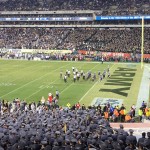 Ironically, I live twenty minutes from West Point and have had the chance to attend numerous Army football games during the course of my lifetime. But the energy level and big game feel that exists when Army and Navy battle on a football field is very different. Even if you’re not a big college football fan, you can’t help but get caught up in the excitement.
Ironically, I live twenty minutes from West Point and have had the chance to attend numerous Army football games during the course of my lifetime. But the energy level and big game feel that exists when Army and Navy battle on a football field is very different. Even if you’re not a big college football fan, you can’t help but get caught up in the excitement.
The game itself went down to the wire (Navy won 21-17), and produced a number of twists and turns to keep everyone on their feet, but there was a media angle which stood out and I thought it was worth sharing with you in this column.
 Often in sports radio, we’re tasked as programming teams to create excitement for a sponsor who’s spending good money with the company and wants to be involved in the content. Programmers get defensive when they hear that because the product is what the audience tunes in for and when bad/forced content enters the mix, listeners leave. If your main job responsibility is to generate ratings, it’s difficult to sign off on accepting content on your airwaves that is going to negatively impact your numbers.
Often in sports radio, we’re tasked as programming teams to create excitement for a sponsor who’s spending good money with the company and wants to be involved in the content. Programmers get defensive when they hear that because the product is what the audience tunes in for and when bad/forced content enters the mix, listeners leave. If your main job responsibility is to generate ratings, it’s difficult to sign off on accepting content on your airwaves that is going to negatively impact your numbers.
However, the real reason why ratings matter is because they’re used to help station’s make money, and reps have one job to do too – add revenue! A rep is not going to admit that their suggestion is flawed or that an idea is bad when they see dollar signs and I can’t blame them for that. They’re human and trying to fatten their wallet and maintain stability with their employer.
But, they also shouldn’t be surprised or upset with the programmer, when they try to maintain the brand’s integrity, grow ratings and do what’s best for the audience. A good rep won’t be afraid to say no or direct a client towards a different path, but many salespeople are so concerned about hitting their monthly budget that they’ll grab the money, run, ignore the details, and try to repair the damage afterwards.
 I remember being in a situation where one of my former morning shows agreed to do some work with a national pizza chain. As part of the partnership, they’d read LIVE endorsements, make a monthly appearance at three local establishments, and then film a video at one of the locations where they were taught how to make pizza. The client also bought recorded commercials, website and social media ads and text message sponsorships.
I remember being in a situation where one of my former morning shows agreed to do some work with a national pizza chain. As part of the partnership, they’d read LIVE endorsements, make a monthly appearance at three local establishments, and then film a video at one of the locations where they were taught how to make pizza. The client also bought recorded commercials, website and social media ads and text message sponsorships.
Sounds simple right? Well, not exactly!
The client kept pushing the rep for more, after the deal had been agreed to, and the rep was so worried about losing the business that they threw in a sponsorship of the station’s mobile app for free for three months.
But that once again wasn’t enough.
 The client threatened to pull the sponsorship unless the station agreed to have the morning show go out on a one-day delivery run which would be promoted on-air, online and on text. I spoke to the morning crew and shared the dilemma with them and because they were good guys who were willing to try and keep clients invested in the brand, they agreed to do the delivery day to try and save the sponsorship.
The client threatened to pull the sponsorship unless the station agreed to have the morning show go out on a one-day delivery run which would be promoted on-air, online and on text. I spoke to the morning crew and shared the dilemma with them and because they were good guys who were willing to try and keep clients invested in the brand, they agreed to do the delivery day to try and save the sponsorship.
Next, we agreed on the local towns where the guys would do their deliveries and on the day of the event, the local stores had their phones ringing off the hook. Business was up 30-40% for the day and we felt the promotion was a success.
Except, the client was once again, not satisfied.
This time, they were not willing to give us credit for their growth because the orders came in by phone and in towns where they already were performing well. They wanted some of their less successful locations to see an increase in activity, and they only wanted to count orders that were placed through the order button on the mobile app. None of this was communicated to me or the morning team prior to the promotion from the rep or the client.
At this point I was frustrated. I sat down with the rep and our national sales manager to ask how much money was being generated with the sponsorship and what their plan was to gain control of the account. The amount we charged was below expectation and their was no plan in place to get on the same page with the client.
 Guess what happened next? You guessed it, the client called and threatened to pull their business again. Except this time, they’d consider staying on board if the morning show did another delivery appearance in a town of their choosing.
Guess what happened next? You guessed it, the client called and threatened to pull their business again. Except this time, they’d consider staying on board if the morning show did another delivery appearance in a town of their choosing.
I knew the client was taking advantage of the situation, and our rep was fearful of standing up to them, so I chose to protect my guys and the product, and decline to do anything further until a meeting was held with all involved.
The client wasn’t interested in meeting and when they pressured our rep to give in or risk losing the account, including this time having our guys do the delivery day in their own vehicles in a bad part of town, I declined and we had to walk from the business.
 Rather than sticking up for myself, our people, and the brand, and reeling in the client, the rep and sales manager got ticked off at the programming team and pushed our boss to make a decision on the situation. They could only see the money in front of them, not the process or effectiveness of the campaign or the way that it had created a divide with the programming department. Luckily our GM was aware of the situation and ruled that the client had to be dealt with differently and offered something else or it would be passed along to another rep.
Rather than sticking up for myself, our people, and the brand, and reeling in the client, the rep and sales manager got ticked off at the programming team and pushed our boss to make a decision on the situation. They could only see the money in front of them, not the process or effectiveness of the campaign or the way that it had created a divide with the programming department. Luckily our GM was aware of the situation and ruled that the client had to be dealt with differently and offered something else or it would be passed along to another rep.
I share this story because it’s a classic case of not managing the client’s expectations and not working with them to create the right game plan. The client didn’t understand how to use the radio station and its people to increase their business and by being unwilling to listen to how to use the product properly, and not receiving the right direction from the rep, it cost them time, money and results.
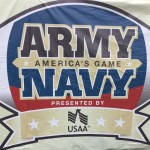 How that applies to this article is simple. If you watched the Army-Navy game on television, listened to it on radio, witnessed it in person at the stadium, or read about it anywhere online or on social media, you couldn’t avoid seeing USAA as the game’s sponsor. They did an outstanding job of “owning” the game without interfering with it.
How that applies to this article is simple. If you watched the Army-Navy game on television, listened to it on radio, witnessed it in person at the stadium, or read about it anywhere online or on social media, you couldn’t avoid seeing USAA as the game’s sponsor. They did an outstanding job of “owning” the game without interfering with it.
What does USAA do? They proudly serve millions of military members and their families with competitive rates on insurance, banking and investment services.
Seems like a great natural fit right? Well, it is!
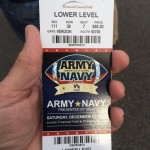 The company understands their target audience, and by sponsoring this game, they’ve positioned themselves well to reach the people they’re after. From the field to the stadium signage to the ticket stubs, everything about the game had USAA involved in it, but they never got in the way of the actual event.
The company understands their target audience, and by sponsoring this game, they’ve positioned themselves well to reach the people they’re after. From the field to the stadium signage to the ticket stubs, everything about the game had USAA involved in it, but they never got in the way of the actual event.
During the radio row event on Friday and Saturday, every radio station host that I spoke with, was not only excited to be there, but felt it was a positive association for their station and show. They mentioned it being one of their favorite trips of the year because unlike the Super Bowl, they didn’t feel pressured to accept guests who’d take away from the show’s direction. An all you can eat Fogo De Chao dinner on Friday night and post-game party at Xfinity LIVE on Saturday night also made them feel important and appreciated.
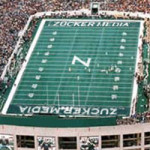 Much of that credit goes to Jimmy Shapiro and Dan Zucker of the Zucker Media Group who have worked with USAA for the past few years to create the event. Jimmy and Dan have a background in sports radio so they recognize what hosts, producers and the audience are looking for, and that allows them to work with USAA to create a great situation for everyone.
Much of that credit goes to Jimmy Shapiro and Dan Zucker of the Zucker Media Group who have worked with USAA for the past few years to create the event. Jimmy and Dan have a background in sports radio so they recognize what hosts, producers and the audience are looking for, and that allows them to work with USAA to create a great situation for everyone.
USAA also deserves some praise because they respect Zucker’s judgment and follow their lead on creating a great radio experience. That willingness to listen, led to WFAN, WIP, KNBR, WFNZ, WBAL, KFAN, KJR, Mighty 1090, Arizona Sports 98.7FM, 104.3 The Fan, 105.3 The Fan, 106.7 The Fan, 104.5 The Zone, SiriusXM, Yahoo Sports Radio, Sports Byline, ESPN Las Vegas and ESPN San Antonio ALL broadcasting from the event this year.
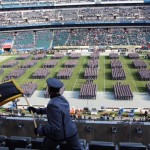 14 of the top 25 markets were present, along with three national networks, and the locations targeted were not only established sports radio brands with good ratings and established audiences, but they were also in areas with strong military representation. That’s smart targeting by Zucker Media and USAA.
14 of the top 25 markets were present, along with three national networks, and the locations targeted were not only established sports radio brands with good ratings and established audiences, but they were also in areas with strong military representation. That’s smart targeting by Zucker Media and USAA.
By having each of those brands broadcast from the event, and making the trip worthwhile, it tells the station’s programmers that they can trust the organizers to do a quality job. When you earn trust with operators, it goes a long way towards developing a strong long-term relationship.
 Not only did USAA receive coverage on some of the top performing stations in the country, but they helped their own image by having people like Roger Staubach, John Feinstein, Sal Paolantonio and Kirk Herbstreit promote the game on their behalf. When those type of personalities spin the message for them, it makes the content more memorable and less likely to be rejected by the audience. If USAA was asking brands to put on the company’s local insurance reps to promote the game, it’d be a very different story.
Not only did USAA receive coverage on some of the top performing stations in the country, but they helped their own image by having people like Roger Staubach, John Feinstein, Sal Paolantonio and Kirk Herbstreit promote the game on their behalf. When those type of personalities spin the message for them, it makes the content more memorable and less likely to be rejected by the audience. If USAA was asking brands to put on the company’s local insurance reps to promote the game, it’d be a very different story.
In evaluating the sponsorship, USAA found a fit that aligns perfectly with their company objectives. Every association with this game benefits them well, including the title “America’s Game“! That’s an easy line for the audience to recall and promote.
When you have a great product and connect it with a sponsor which has a natural fit and understands how to benefit from the association, this is the kind of success that can follow:
- Over 69,000 in attendance for the game
- The highest television ratings for the Army/Navy game in nearly two decades
- An increase in television ratings for the game for the fifth consecutive season
- Radio promotion on 23 radio shows and 3 national networks on Friday and Saturday
- The top trend on Twitter including social promotion from numerous high profile personalities
 The Army-Navy game and USAA partnership has paid great dividends because everyone understands the objective and how to promote the game. The company realizes that the campaign is built from awareness and positive association, and the star of the promotion is the game itself.
The Army-Navy game and USAA partnership has paid great dividends because everyone understands the objective and how to promote the game. The company realizes that the campaign is built from awareness and positive association, and the star of the promotion is the game itself.
Because USAA doesn’t try to get in the way of the game and simply uses it as a way to further brand themselves, they’re well received. This makes people more likely to look to them when needs arise in their lives.
As a customer of USAA myself, I was impressed with their approach. Every piece of media had their name attached to it and when a company develops a solid reputation and connects themselves to other quality programs, it reflects good judgment and makes you feel good about supporting them.
It was evident that a lot of time, thought and creativity went into the marketing campaign for this game and because of it, USAA will see their business grow. Hopefully the members of that pizza chain were taking notes.
Under The Radar:
Seth Everett filled in for 790 The Ticket in Miami this past Saturday. No word yet on whether or not he will appear again on the radio station.
Jim Bowden is doing less hosting on SiriusXM’s MLB channel. Bowden’s ESPN responsibilities have kept him busy during the MLB off-season. Former MLB Closer Brad Lidge and former MLB OF/IB Cliff Floyd are stepping in for Jim this week with Casey Stern.
After ESPN 105.5 exited the format last week, don’t expect Denver sports radio leader 104.3 The Fan to go unchallenged for long. Look for another competitor to emerge real soon. An announcement could come as early as next week.

Jason Barrett is the Founder and CEO of Barrett Media. The company launched in September 2015 and has provided consulting services to America’s top audio and video brands, while simultaneously covering the media industry at BarrettMedia.com, becoming a daily destination for media professionals. Prior to Barrett Media, Jason built and programmed 95.7 The Game in San Francisco, and 101 ESPN in St. Louis. He was also the first sports programmer for SportsTalk 950 in Philadelphia, which later became 97.5 The Fanatic. Barrett also led 590 The Fan KFNS in St. Louis, and ESPN 1340/1390 in Poughkeepsie, NY, and worked on-air and behind the scenes at 101.5 WPDH, WTBQ 1110AM, and WPYX 106.5. He also spent two years at ESPN Radio in Bristol, CT producing ‘The Dan Patrick Show’ and ‘GameNight’. JB can be reached on Twitter @SportsRadioPD or by email at Jason@BarrettMedia.com.



